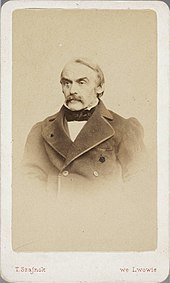Karol Szajnocha
Karol Szajnocha (also: Scheynoha de Wtellensky , Szejnoha de Wtellensky , born November 20, 1818 in Komarno , † January 10, 1868 in Lemberg ) was a Polish writer and historian.
Szajnocha grew up in Lemberg, which was occupied by Austria after the partition of Poland . As a schoolboy, he founded the secret historical society Towarzystwo Starożytności in 1835 , which aroused the suspicion of state authorities, but initially caused him only minor reprisals because of its obvious harmlessness.
In 1835 Szajnocha began studying at the Philosophical Faculty of Lviv University . There he was arrested for distributing anti-Austrian poems and was imprisoned in chains and in the dark for two years, which led to permanent health damage.
After his release from prison he was not allowed to continue his studies and worked as a tutor and proofreader for the local magazines Dziennik Mód Paryskich , Lwowianin , Rozmaitości and Gazeta Lwowska . In 1838 he joined the illegal Polish organization Młoda Sarmacja , although he was under police surveillance. In 1853 Szajnocha was custodian of the Ossolineum in Lemberg. After six years, however, he had to give up the job because of increasing blindness.
Szajnocha wrote numerous historical works that enjoyed enormous popularity. His most important six-volume work, Monumenta Poloniae historica , was published between 1864 and 1893.
Works
- Bolesław Chrobry , 1848
- Pierwsze odrodzenie sie Polski 1279–1333 , 1849
- Szkice historyczne , 4 volumes, 1854–69
- Jadwiga i Jagiełło , 3 volumes, 1855–56
- Lechicki początek Polski , 1858
- Dwa lata dziejów naszych, 1646–1648 , 2 volumes, 1865–69
literature
- Constantin von Wurzbach : Szajnocha, Karl . In: Biographisches Lexikon des Kaiserthums Oesterreich . 41st part. Kaiserlich-Königliche Hof- und Staatsdruckerei, Vienna 1880, pp. 128–133 ( digitized version ).
- Szajnocha Karol. In: Austrian Biographical Lexicon 1815–1950 (ÖBL). Volume 14, Verlag der Österreichischen Akademie der Wissenschaften, Vienna 2012–,ISBN 978-3-7001-7312-0, p. 106 f. (Direct links on p. 106 , p. 107 ).
Web links
| personal data | |
|---|---|
| SURNAME | Szajnocha, Karol |
| BRIEF DESCRIPTION | Polish writer and historian |
| DATE OF BIRTH | November 20, 1818 |
| PLACE OF BIRTH | Komarno (Galicia) |
| DATE OF DEATH | January 10, 1868 |
| Place of death | Lviv |
